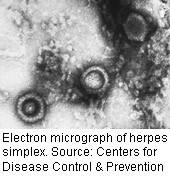Pericoital application of tenofovir gel linked to reduced risk of HSV-2 infection
THURSDAY, Aug. 6, 2015 (HealthDay News) — Pericoital application of tenofovir gel may substantially cut women’s risk of contracting herpes simplex virus type 2 (HSV-2), according to a study published in the Aug. 6 issue of the New England Journal of Medicine.
The current trial was not primarily designed to test tenofovir gel against HSV-2; its main aim was to curb the risk of HIV transmission. The oral formulation of tenofovir, which is marketed as Viread, is already used to treat HIV. Earlier results from the trial had suggested the gel version can reduce women’s risk of contracting HIV. However, follow-up research yielded disappointing results — largely because many women were not able to use the gel consistently.
The current study looked at a subgroup of women who’d taken part in the larger trial testing tenofovir gel against HIV. The group included 422 who were free of HSV-2 when they were randomly assigned to use either the drug or an inactive placebo gel; they were told to apply it vaginally before and after having sex. The investigators found that over 18 months, women who used the drug-containing gel were 51 percent less likely to contract HSV-2, compared to the placebo group.
The gel is still experimental, stressed study leader Salim Abdool Karim, M.B., Ch.B., Ph.D., director of the Center for the AIDS Program of Research in Durban, South Africa. Further research will probably be necessary for drug regulators in various countries to consider approving the medication, Karim told HealthDay.
Gilead Sciences, the U.S. maker of Viread, donated the drug’s active ingredient for use in the study.
Full Text (subscription or payment may be required)
Copyright © 2015 HealthDay. All rights reserved.








